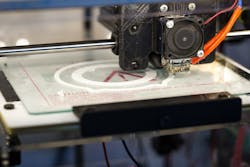Project solves testing swab shortage with 3D-printed swabs
An effort originally launched in April and led by a fellow in the UCLA Biodesign program has yielded positive results, solving the health system's shortage of nasopharyngeal swabs – a key element in COVID-19 testing.
At the end of April, UCLA Health announced the project and institutional review board (IRB) approval of a protocol for a validation study of new swabs. In just over a month, and after conducting rigorous clinical testing of several 3D-printed swab prototypes on patients with COVID-19, UCLA Health was granted permission from the U.S. Food and Drug Administration (FDA) to use the most promising design, which is from Resolution Medical.
"With the rapid spread of the coronavirus, testing supplies – especially nasopharyngeal swabs – were suddenly in high demand and short supply on a local, national, and even global scale. After working with a variety of manufacturers to test various designs, we now have a secure source to supply all of UCLA Health's swabs as the need for COVID-19 testing continues to grow," said Gabriel Oland, MD, a general surgery resident at UCLA David Geffen School of Medicine and a fellow in the UCLA Biodesign program, who helped lead the effort to test swabs that could be manufactured swiftly and in large quantities.
Unlike swabs with woven fiber at the tip – similar in appearance to cotton swabs found in stores for consumer use, but made with longer shafts and sterile, spongy materials – UCLA Health's new swabs, like many others, consist of a single plastic material from tip to tip, with a lattice design to collect a sample at one end.
Omai Garner, PhD, director of clinical microbiology testing for UCLA Health, said, "Before the pandemic, we used about 200 nasopharyngeal swabs a day, but now we need 500-600 for COVID-19 testing alone, and we anticipate needing over 1,000 each day in the coming months."
Although the FDA normally requires lengthy and thorough testing and validation of new medical products, swabs fall into a category for which the onus of validation instead rests with hospitals and clinical labs.

